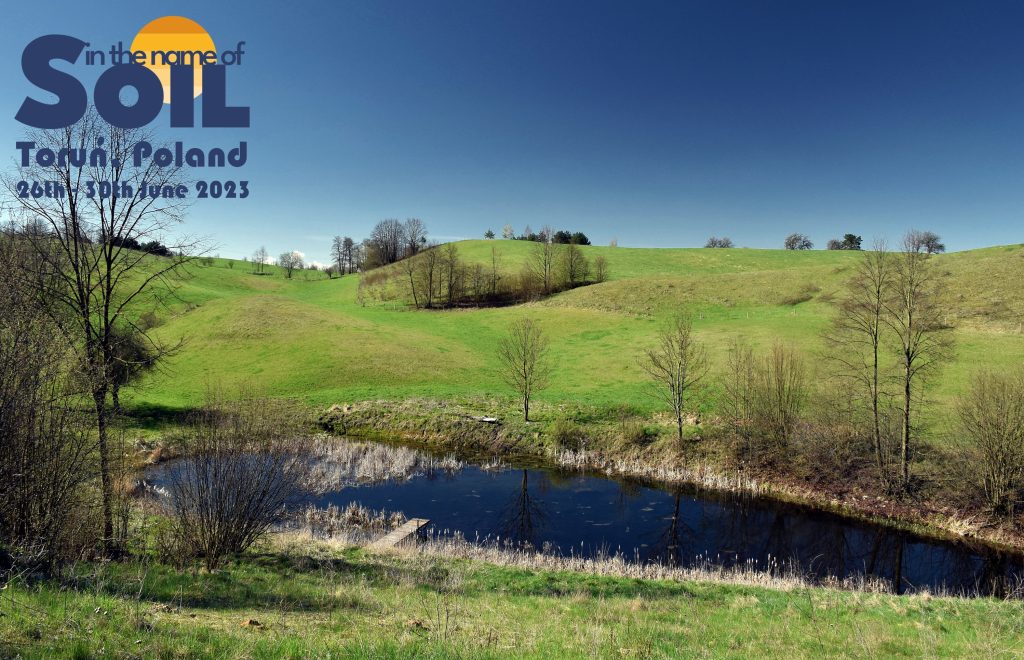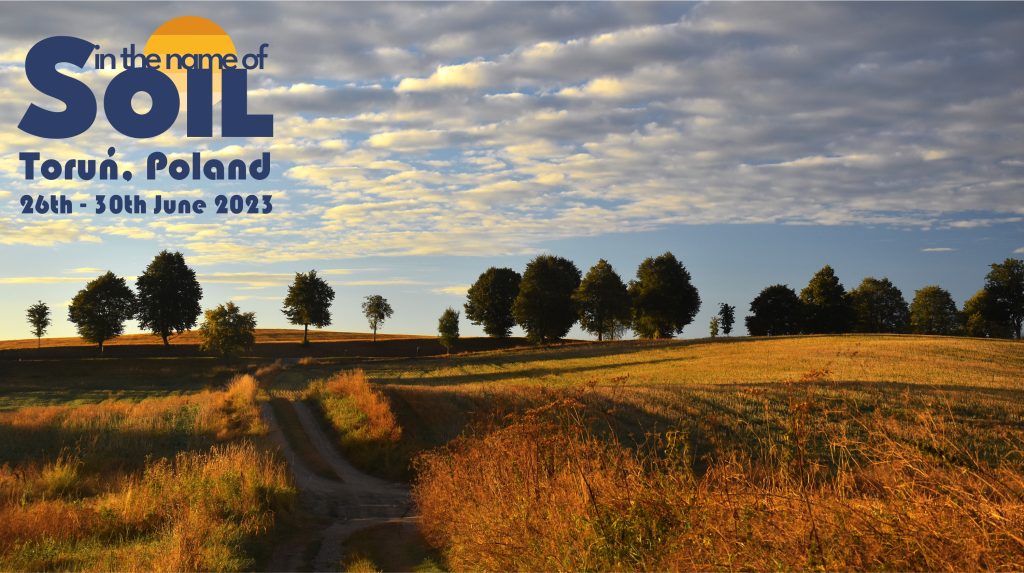“In the name of Soil – Ecopedological Workshop” – Blended Intensive Course 2024
Erasmus+ Project for HEIs
Name: “In the name of Soil – Ecopedological Workshop”
Type of course: blended intensive course (obligatory virtual + physical components)
Number: tbd
Coordinating University: Nicolaus Copernicus University in Toruń (Poland)
Partner Universities:
- Ljubljana University, Slovenia
- Vytautas Magnus University, Lithuania
- Saragossa University, Spain
- Estonian University of Life Sciences, Tartu
- Latvia University of Life Sciences and Technologies, Jelgava
- Czech Life Sciences University, Prague
Funding: Erasmus+ short term mobility with a compulsory virtual component, KA131
Participation in classes is free of charge

FEES
Accommodation (including breakfasts) and boxed lunches will be provided. Participants have to cover upon arrival the cost of accommodation and lunches with Erasmus+ funding.
DATES
1–20 September 2024 – virtual component
23–27 September 2024 – physical component – Nicolaus Copernicus University in Toruń (Poland)
Erasmus+ grant application deadline: may vary depending on the university
TARGET GROUP
Target groups are students (all levels) of environmental related programmes (geography, earth sciences, environmental protection, agriculture, forestry etc.) from partner institutions (direct beneficiaries) and academicians and students from other EU and non-EU universities (beneficiaries participating on their own expenses).
STUDY CREDITS (ECTS)
Successful completion of the course can be awarded with 3 credits according to the European Credit Transfer System (ECTS). Credits will be awarded on the basis of participation in lectures, completing test following the virtual component, active participation in fieldwork and preparing report (team work) after a face-to-face component. Transcript of records will be issued by the coordinating institution. In order to include the credits in the curriculum at the home institution, participants need a learning agreement with the responsible person at the home institution.
ON-LINE LEARNING ENVIROMENT
The online component of the course will be hosted via MS Teams, the collaborative online learning platform of the Nicolaus Copernicus University. Participants need to have a stable internet connection, a computer, a headset, and a webcam. Sessions will be held (recorded lectures) and synchronously (exercises) in the CEST time zone.
TEACHING STAFF
The course will be delivered in English by teachers from Nicolaus Copernicus University, Ljubljana University, Slovenia; Vytautas Magnus University, Lithuania; University of Pécs, Hungary; Estonian University of Life Sciences, Tartu; Latvia University of Life Sciences and Technologies, Jelgava.
PROGRAMME OVERVIEW
The main aim of the course is to raise theoretical and practical qualifications and skills of students and young researchers. We expect a significant increase of both hard and soft competences of students. Students will learn to describe and classify soils and how to interpret it in terms of their ecological value, sustainable use and protection of soil resources. Students will be instructed how to lead scientific discussion when giving and/or receiving feedback and how to evaluate and judge effects of others work. The possibility of communicating and working in international teams will be developed, as well as self-motivation. Students shall complete their assignments and will be encouraged to seek a solutions, be flexible and manage their time efficiently, as well as to prioritize and organize tasks to meet deadlines.
The overall workload is 90 hours. Students will be required to attend 12 hours of online asynchronous sessions – each week there will be 2 lectures available and also on-line Q&A meeting to discuss issues from each week lectures.
Topics:
- Introduction to WRB as Lingua Franca;
- Diagnostic features – structure, accumulation of substances;
- Redoximorphic features;
- Diagnostic horizons;
- Diagnostic properties and materials;
- Reference Soil Groups (RSGs);
- Qualifiers and soil naming;
- Geography and geology of the Toruń area;
- field soil classification;
- laboratory methods for WRB soil classification.
Afterwards it will be followed by 40 physical hours, held at the Nicolaus Copernicus University in Toruń and in various locations in the region for fieldwork – alluvial plains, Toruń basin, morainic plateaus (Bus will be provided) (Poland). Another 30 hours is planned for self-study, using materials on the ‘MS Teams’, an online learning platform of the Nicolaus Copernicus University.
In order to successfully complete the course students will have to: participate actively in classes, pass the test, be active during fieldworks (team work), prepare report (team work in international groups) and present it last day of face-to-face component, after fieldwork activities.
DEATILED COURSE CONTENT
1–20 September 2024 – online module
An on-line module will focus on introducing the theoretical framework of soil classification to provide knowledge on developing practical skills related to soil naming and interpretation of their ecological value.
Students will become acquainted with different cultures, learn about the challenges of sustainable development with focus on soil resources. They will develop also communication skills and expand the range of vocabulary from the area of soil science.
Classes will require pre-class preparation complemented with follow-up assignments. Students will be familiarized with field work. All learning resources will be available on the NCU MS Teams platform. The virtual component is aimed at preparing students for practical, workshop-format classes that will follow in a physical module.
23–27 September 2024 – physical module at Nicolaus Copernicus University in Toruń
Students will learn to describe, interpret and classify soils in terms of their ecological value, sustainable use and protection and conservation of soil resources. Students will be instructed how to lead scientific discussion when giving and/or receiving feedback and how to evaluate and judge the effects of others’ work. The on-campus module will take the format of plenary sessions and group workshop sessions aimed at developing practical skills. In international teams, students will prepare report and deliver a presentation on the results of fieldworks.
Face-to-face component SCHEDULE (more details to come – stay tuned)
- Day 1 – Monday (23rd September 2024): welcome speeches and Workshop opening, ice breaking and international soil introductions, lectures: Soil degradation as a factor influencing migrations; study profile – practical lesson how to interpret soils systematic position in relation to environment, spatial planning and protection?
- Days 2-4, Tuesday-Thursday (24-26th September 2024):
The classification of exemplary profiles of soils from region of workshop area (Vistula Landscape Park, Toruń Basin, Brodnica/Dobrzyń lakeland)according to international classification system WRB and comparison it with national classifications – fieldworks and mobile data collection; Discussion on the classification of the observed soils;
- Day 5 –Friday (27th September 2024): Workshop – filling in in mixed international groups soil reports from collected data in on-line data base gathered during fieldworks, discussions, improvement suggestions,
- Assesment – Student presentations of collected materials in the form of reports prepared in mixed international groups – seminar and discussion;
APPLYING
More details soon
DOWNLOADS
Usufull textbooks, handbooks and other materials:
Illustrated Handbook of WRB Soil Classification
https://www.researchgate.net/publication/266851450_Soil_Sequences_Atlas
https://www.researchgate.net/publication/325270009_Soil_Sequences_Atlas_II
https://www.researchgate.net/publication/329781505_Soil_Sequences_Atlas_III
https://www.researchgate.net/publication/329781935_Soil_Sequences_Atlas_IV
https://www.researchgate.net/publication/367334985_Soil_Sequences_Atlas_V


 ul. Lwowska 1, 87-100 Toruń
ul. Lwowska 1, 87-100 Toruń